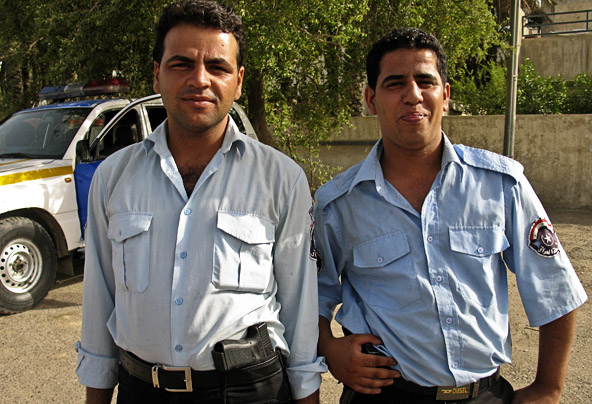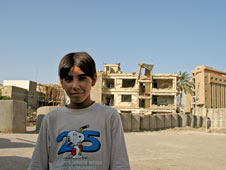
10 June, Baghdad, Iraq. Two Shiite policeman on the corner where I would narrowly escape being kidnapped a few days later. Many of the police at the edge of Sadr City were either in league with the death squads or were unable to stop them from operating.
Photo: Phillip Robertson
An unintended side effect of the elections is that Shiite militias have so deeply infiltrated the government, that it is not clear exactly where to draw the line between legitimate organizations and the armed gangs. The interior ministry managed a secret facility that was used as a torture site for its prisoners. In Iraq, it is the interior ministry that controls the police. Militias also control the government prisons, the transportation ministry and have serious leverage over some of Baghdad's large hospitals.
As the armed groups have enjoyed a spike in popularity and power, I wanted to understand how the Mahdi Army is responding to the attacks on Shiite civilians, a side of their movement they do not readily discuss with outsiders. A Shia contact in Baghdad made a telephone call and organized a meeting with a commander in charge of a number of smaller Mahdi cells, and this places him not too far up the chain of command, but in the middle. On the 6th of June, I was instructed to wait at the Habaibna restaurant in Talbiyah, a mixed neighborhood known for bomb attacks, and within five minutes of the scheduled appointment, two serious men in a BMW rolled up in the parking lot and told us to follow them. Instead of taking us back to Sadr city, the Mahdi Army stronghold, we headed all the way back into town, to the Sunni neighborhood of Zayouna.
In a house set back from the highway, on a street barricaded by palm logs and debris, a dozen Mahdi Army men gathered in the living room of Salman Al Darragi's house, ranging from their early twenties to forties, a few were veterans of the street fighting in 2004. Everyone was polite and ready to participate in the discussion, but they let Al Darragi speak first and listened quietly to our discussion.
The genial and Buddha-like Al Darragi is well respected in the militia and his group makes money by running a propane gas franchise behind the house, part of the vibrant sectarian militia/business environment found in Baghdad these days. Al Darragi relaxed against his wall as soft drinks were brought in by one of his kids. The young men, all fighters without weapons, came and sat on cushions against the wall and brought their difficulties to him. One young fighter complained that Iraqi police kept cutting in line for fuel at their gas station and it was causing problems. We did not talk about where al Darragi got his fuel stock, but behind the house was a government gasoline tanker unhitched from its cab. The Mahdi commander, after laying out a long and ridiculous conspiracy theory that involved American soldiers burying IED's in Sadr city, began to talk relatively freely about the Mahdi Army's military operations. This is unusual for the militia and may have only happened because the political leadership in Sadr city had no idea he was meeting with a reporter.
We were talking about Sunni groups which were targeting Shiite civilians when Al Darragi volunteered that the Mahdi Army in Sadr City had a suspect in a mosque bombing who was scheduled for execution. "If he is guilty of killing, then he must be killed. That is the Sharia law. This man already confessed that he was killing people." Al Darragi shrugged as if to say, "This is how it works, what can I do?" The police regularly find bodies, bound and executed at the edge of Sadr city, in a place called Al Seddeh. I listened as Darragi was talking about a secret court in Sadr city where the Mahdi Army held people they captured, tried them and passed sentence. When I asked to visit the sharia court and talk to the mosque bombing suspect, Darragi said, "I would have to blindfold you and that would be embarrassing for both of us. The court is in a secret place, but I will ask if it is possible." When I called Darragi the next day, his phone was switched off. I went to pay him a visit a few days later after not being able to reach him and he was gone, one of his men said he was in Turkey. Al Seddah has a nickname. Iraqis call it "The Happiness Hotel."
Before I left Darragi's house, the commander talked about his frustration with the current arms ban in Baghdad only the Army, the police and US forces are allowed to carry arms on the street. "If I could bring my weapons I could go to al Rusafa (Baghdad west of the Tigris) and capture the terrorists who are building the bombs and sending them to this side of the city. Now, I can do nothing." If the pressure was off Darragi and his men, it is a safe bet that there would be open conflict on the streets of Baghdad, this time not with the Americans, but between the Shia and the Sunni groups. The battle for the control of Iraq will be fought in these neighborhoods.
The Mahdi Army is a many-headed creature, a fundamentalist Shiite religious movement, an armed group, and a social welfare agency, which has been long underestimated by the United States. The militia leadership quickly moves to set up its own sharia courts where it has unquestioned authority. In the summer of 2004, clerics with the Sadr movement ran such a court in Najaf in a small alley near the shrine where clerics schooled in Islamic Law would adjudicate and render decisions, about small disputes and more serious cases. In Sadr City, the Mahdi Army is again carrying out its own justice, leaving the bodies of the killed in a bare patch of ground. This is not activity by rogue or undisciplined elements within the movement, it is a carefully orchestrated response to the attacks of Sunni extremists.
With each new mosque bombing and assassination it is easy to imagine the advent of maximum darkness, a situation where no Sunni Arab family is safe in Iraq and the entire society has fallen into the orbit of the militias. Forming only a fifth of the population, the Sunni population is a minority and both sides are preparing for a fight.
Ahmed, the guitar player son of Shiite and Sunni parents, who is often philosophical
told me, "The killings are becoming something that's normal. When you hear about someone
you know who has been killed, there's a part inside of you that shakes. Now when I hear
that someone I know has been killed. I don't feel anything. It's like a part of me has
died."![]()
This series was originally published in Salon.com, edited by Gary Kamiya.
 LEAD IMAGE: 6 June, 2006, Baghdad, Iraq. A young Shiite boy, Hassan, stands in front of the bombed complex at the Hamra hotel, in Karrada. Hassan's father shattered his leg when the roof collapsed and was no longer able to provide for his family. They now survive on what Hassan can earn doing odd jobs. A few months earlier, Al Qaeda in Iraq used two massive truck bombs to try to breach the perimeter of the hotel where foreign media was staying.
LEAD IMAGE: 6 June, 2006, Baghdad, Iraq. A young Shiite boy, Hassan, stands in front of the bombed complex at the Hamra hotel, in Karrada. Hassan's father shattered his leg when the roof collapsed and was no longer able to provide for his family. They now survive on what Hassan can earn doing odd jobs. A few months earlier, Al Qaeda in Iraq used two massive truck bombs to try to breach the perimeter of the hotel where foreign media was staying.Photo: Phillip Robertson
© Phillip Robertson, 2009-2014.
